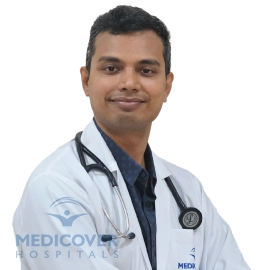Best Cardiomyopathy Doctors in Begumpet
Cardiomyopathy is a severe heart condition that affects the heart muscle, leading to weakened cardiac function and potentially life-threatening complications. Understanding why you should seek specialized care, how to prepare for the procedure, what to expect during the procedure, and the recovery process is crucial for anyone diagnosed with this condition.
Why Get Cardiomyopathy Treatment?
Cardiomyopathy can significantly impact your quality of life and overall health. It often leads to symptoms like breathlessness, fatigue, and arrhythmias, which can be debilitating. Seeking specialized treatment is essential for several reasons:
- Accurate Diagnosis: Medicover cardiomyopathy specialists use advanced diagnostic tools to accurately identify the type and severity of the condition.
- Expert Care: These specialists are trained to manage complex cases and provide tailored treatment plans that address individual patient needs.
- Advanced Treatments: Medicover offers advanced treatment options, including medication management, surgical interventions, and lifestyle modifications to manage and improve heart function.
Cardiomyopathy Preparation
Initial Consultation
Your journey begins with an initial consultation, during which a cardiomyopathy specialist will review your medical history and symptoms and perform a physical examination. Diagnostic tests such as echocardiograms, MRIs, or blood tests may be ordered to confirm the diagnosis and determine the best course of action.
Pre-Procedure Instructions
Before undergoing any procedure, your specialist will provide specific instructions. These may include:
- Fasting: Depending on the type of procedure, you may be required to fast for a certain period.
- Medication Adjustments: You might need to stop or adjust certain medications.
- Pre-Procedure Tests: Additional tests might be necessary to ensure you are fit for the procedure.
Cardiomyopathy Procedure Duration
The duration of cardiomyopathy procedures can vary based on the type and complexity of the treatment. Below are some standard procedures and their typical durations:
Medication Management
For many patients, medication is the first line of treatment. Adjusting dosages and monitoring effects can take several weeks to months.
Surgical Interventions
- Implantable Cardioverter-Defibrillator (ICD) Placement: This procedure typically takes 1 to 2 hours.
- Heart Transplant: A heart transplant is a complex surgery that can take 4 to 6 hours or longer.
Minimally Invasive Procedures
- Catheter Ablation: This procedure usually takes 2 to 4 hours.
- Septal Myectomy: A surgical procedure to remove thickened heart muscle, which can take 3 to 5 hours.
Medication Management
Patients on medication may notice improvements within a few weeks, but ongoing monitoring and adjustments are often required.
Surgical Interventions
- ICD Placement: Recovery from ICD placement typically takes a few days to a week.
- Heart Transplant: Recovery from a heart transplant can take several months, and patients will need lifelong follow-up care.
Minimally Invasive Procedures
- Catheter Ablation: Recovery usually takes a few days to a week.
- Septal Myectomy: Full recovery can take several weeks to a few months.
Cardiomyopathy Post-Procedure Care
Hospital Stay
Depending on the procedure, you may need to stay in the hospital for observation. This can range from a few hours for minor procedures to several weeks for significant surgeries like a heart transplant.
Medications
Post-procedure care often involves a regimen of medications to manage symptoms and prevent complications. These may include:
- Anticoagulants: To prevent blood clots.
- Beta-Blockers: To manage heart rate and blood pressure.
- Diuretics: To reduce fluid buildup.
Cardiomyopathy Back to Work
Returning to work after cardiomyopathy treatment depends on the type of procedure and your recovery progress.
Medication Management
Patients managing their condition with medication can often return to work relatively quickly, sometimes within a few days to weeks, depending on their overall health and job demands.
Surgical Interventions
- ICD Placement: Most patients can return to work within a week, but those with physically demanding jobs may need more time.
- Heart Transplant: Returning to work can take several months, and it often depends on the individual's recovery and the physical demands of their job.
Minimally Invasive Procedures
- Catheter Ablation: Patients can often return to work within a week.
- Septal Myectomy: Full recovery and return to work can take several weeks to a few months.


